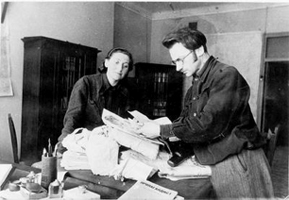AVROM SUTZKEVER
 |
| Sutzkever and
his wife Frida 03/1944 (Markowa, Lithuania – The Partisans).
ID: 4245 Catalogue: 2074/9. From the photographic archives of Yad
Vashem, Israel. |
Avrom
Sutzkever, also spelled Abraham Sutzkever or Avraham Sutskever
was born on July 15, 1913 in Smorgon, Russian Empire, now Smorgon Belarus.
A significant Yiddish poet who after the Holocaust became a major figure
in Yiddish letters in Israel and throughout the world. He died on January
20, 2010 in Tel Aviv, Israel at the age of 96. (Wikipedia)
Avrom Sutzkever spent his early childhood in Omsk, Siberia, where his
parents took refuge from the invading German armies during World War
I. Following the death of his father, Sutzkever’s mother, Rayne,
resettled the family in Vilna in 1921. Sutzkever attended local heders
and the Polish Jewish high school Herzliah, audited university classes
in Polish literature, and was introduced by a friend to Russian poetry.
His earliest poems were written in Hebrew.
Sutzkever published his first piece in the magazine of the Jewish scouting
organization, Bin. In 1933, he became part of the writers’
and artists’ group Yung-Vilne, along with fellow poets Shmerke
Kaczerginski, Chaim Grade, and Leyzer Volf. He also moved to Warsaw
that year. His maiden volume, Lider (Poems), was published
by the Yiddish PEN Club (1937); a second, Valdiks (Of the Forest;
1940), during the interval of Lithuanian autonomy.
After the German invasion in June 1941, Sutzkever and his wife, Freydke,
whom he had married in 1939, were herded into the ghetto with other
Vilna Jews. Under cover of forced labor, Sutzkever smuggled arms into
the ghetto and concealed rare Jewish books and manuscripts from the
YIVO collection, which he unearthed after the war.
Writing poetry under aggravated conditions, he described several brushes
with death, the murders of his mother and his newborn son, the cultural
and underground resistance, and ghetto events and personalities. His
long poem Dos keyver-kind (The Grave Child) was awarded a literary
prize by the ghetto Writers Union in 1942, and his poem Unter dayne
vayse shtern (Beneath the Whiteness of Your Stars) was set to music
by Avreml Brudno. The Sutzkevers escaped in September 1943 with a unit
of the Federated Partisan Organization (FPO) and joined a Jewish partisan
group under Soviet command in the Naroch forest.
Admiration for his poems smuggled from the ghetto by a Lithuanian courier
prompted the Jewish Anti-Fascist Committee in the USSR to airlift Sutzkever
to Moscow, where he served as a witness-survivor of the destruction
of Polish Jewry. Ilya Ehrenburg’s profile of the poet in Pravda
(29 April 1944) was one of the first official Soviet notices of the
Holocaust.
In Moscow, Sutzkever participated in the work of Ehrenburg’s literary
commission for the preparation of the Black Book. He also wrote a prose
account titled Fun vilner geto (Of the Vilna Ghetto), parts
of an ode of parting called Tsu Poyln (To Poland), and much
of Geheymshtot (Secret City), an epic poem chronicling the
attempt of 10 Jews to survive destruction in the sewers of Vilna.
Sutzkever befriended members of the Soviet Yiddish intelligentsia and
testified on behalf of Russian Jewry at the Nuremberg Trials. With a
newborn daughter, Rina, the Sutzkevers returned to Poland in 1946, then
on to Paris and Palestine in 1947. In Tel Aviv, he founded the literary
quarterly Di goldene keyt (The Golden Chain), remaining its
editor until its closing in 1995.
Sutzkever emerged as a “national poet,” addressing large
historical subjects in works of epic scale while creating deeply personal,
sometimes idiosyncratic, contemplative verse. The series Lider fun
togbukh (Poems from a Diary; 1974–1981), which is
considered his masterpiece, fuses philosophical reflection, autobiography,
and observation into a modern Psalter. Through formal elegance and masterful
rhyming, it conveys his image of an organic universe that reintegrates
what history has torn apart, including those murdered in Europe from
those who carry their memory.
Sutzkever’s works have been translated into English, Swedish,
French, Hebrew, Polish, and other languages. Benjamin Harshav ranks
him as “one of the great poets of the twentieth century”
(Harshav, 1991, p. 3).
Source:
YIVO Institute of Jewish Research, New York
Wisse, Ruth R. Sutzkever, Avrom YIVO Encyclopedia of Jews in Eastern
Europe 21 October 2010.
(Wisse, Ruth R. - Martin Peretz Professor of Yiddish Literature and
Professor of Comparative Literature, Harvard University)
For complete article & further resources visit: http://www.yivoencyclopedia.org/article.aspx/Sutzkever_Avrom
Suggested
Reading:
Benjamin Harshav, A. Sutzkever: Selected Poetry and Prose (Berkeley,
1991);
Abraham Nowersztern, Avrom Sutskever-bibliografye (Tel Aviv, 1976);
Abraham Nowersztern, Avraham Sutskever bi-melot lo shiv‘im / Avrom
Sutskever tsum vern a ben-shivim (Jerusalem, 1983), in Yiddish and Hebrew;
Ruth Wisse, “The Ghetto Poems of Abraham Sutzkever,” Jewish
Book Annual 36 (1978–1979): 26–36, reprinted in Jewish Book
Annual 54 (1996–1997): 95–106.
For further
information:
United States
Holocaust Memorial Museum Washington
Yad Vashem
The Holocaust Martyrs' and Heroes' Remembrance Authority
Wikipedia
Overview
of Liddish Literature, Wikipedia





